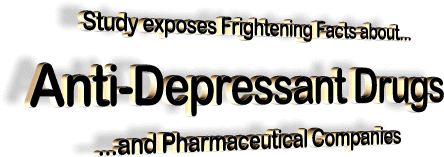|
from Collective-Evolution Website
The realities of the pharmaceutical industry are admittedly difficult to swallow, but this is important information given the fact that so many people are taking anti-depressant drugs.
While these details may be disturbing, especially if you or someone you know takes anti-depressant drugs, it is important to move past the fear of information and really look at what has happened with the modern day medical industry and the pharmaceutical stranglehold that plagues it today.
The most recent example of this kind of corruption comes from a study that was published last week in the British Medical Journal by researchers at the Nordic Cochrane Center in Copenhagen.
The study showed that pharmaceutical companies were not disclosing all information regarding the results of their drug trials.
Researchers looked at documents from 70 different double-blind, placebo-controlled trials of selective serotonin reuptake inhibitors (SSRI) and serotonin and norepinephrine reuptake inhibitors (SNRI) and found that the full extent of serious harm in clinical study reports went unreported.
These are the reports sent to major health authorities like the U.S. Food and Drug Administration.
Tamang Sharma, a PhD student at Cochrane and lead author of the study, said:
Joanna Moncrieff, a psychiatrist and researcher at University College London, elaborates:
Peter Gotzsche, a clinician researcher at Cochrane and the co-author of the study, actually tried to gain access to clinical trial reports almost a decade ago for anti-obesity pills.
Unfortunately, the European Medicines Agency (EMA) denied them the reports:
It took years of requests and complaints for this to happen and, while Gotzsche is pleased they were able to achieve this breakthrough, he reminds us that similar progress has yet to made in the United States.
He went on to state that researchers need better access to data from clinical trials to conduct assessments unimpeded by industry influence:
Moncrieff (quoted above) then goes on to express further concerns:
This Is Not The First Time
This is not the first time that pharmaceutical companies have been caught manipulating science in order to get antidepressants onto the shelves.
It was only a couple of months ago that an independent review found that the commonly prescribed antidepressant drug Paxil (paroxetine) is not safe for teenagers, even though a large amount of literature had already suggested this previously.
The 2001 drug trial that took place, funded by GlaxoSmithKline, found that these drugs were completely safe, and used that ‘science' to market Paxil as safe for teenagers.
John Ioannidis, an epidemiologist at Stanford University School of Medicine and co-author of the study, is also the author of the most widely accessed article in the history of the Public Library of Science (PLoS), titled Why Most Published Research Findings Are False.
In the report, he states that "most current published research findings are false." And this was more than 10 years ago — the situation has undeniably worsened in the interim.
This echoes the words of Dr. Richard Horton, the current Editor-In-Chief of one of the most reputable reviewed medical journals in the world:
The Editor in Chief of the New England Medical journal, which is also considered to be one of the best in the world, has made similar assertions:
A couple of years ago, Lucia Tomljenovic, a PhD in biochemistry and a senior postdoctoral fellow in UBC's Faculty of Medicine, uncovered documents that reveal vaccine manufacturers, pharmaceutical companies, and health authorities have known about multiple dangers associated with vaccines but chose to withhold them from the public.
The documents were obtained from the UK Department of Health (DH) and the Joint Committee on Vaccination and Immunization (JCVI), who advise the Secretaries of State for Health in the UK about diseases preventable through immunizations.
The JCVI made,
She goes on to explain that,
Below is a clip taken from the One More Girl documentary, a film which looks at the Gardasil vaccine, a medicine designed to prevent Human Papillomavirus.
In it, Dr. Peter Rost, MD, a former vice president of one of the largest pharmaceutical companies in the world (Pfizer), shares the truth about the ties between the medical and pharmaceutical industry.
Rost is a former vice president of Pfizer, and a whistleblower of the entire pharmaceutical industry in general.
He is the author of The Whistleblower - Confessions of a Healthcare Hitman...
Considering his work experience, it would be an understatement to say that he is an insider expert on Big Pharma marketing.
It's time to re-think current medical research and look at the bigger picture.
|


